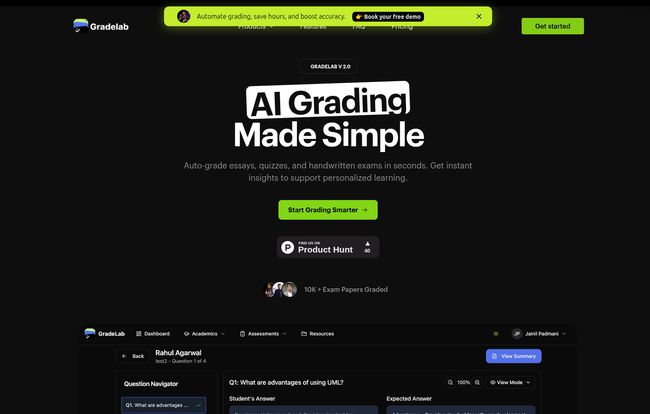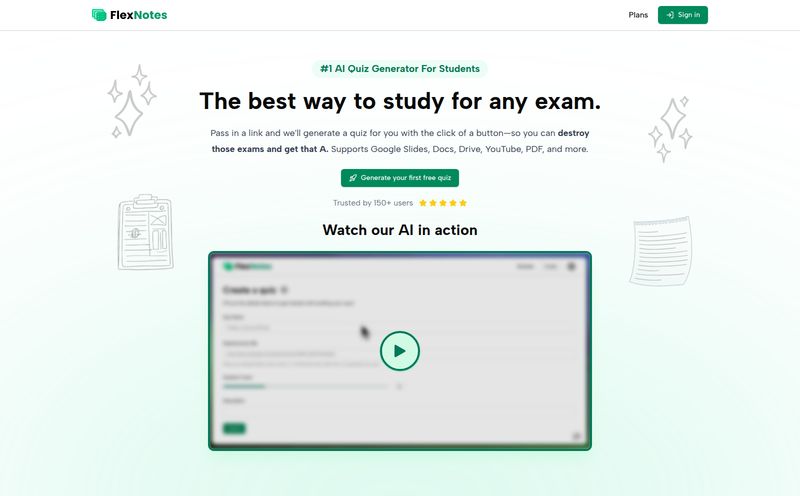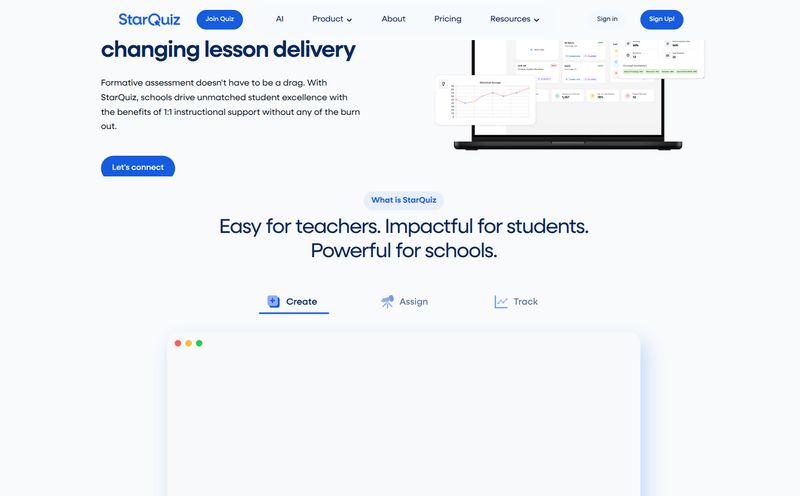If you're an educator, you know the feeling. The weekend is calling your name, but there’s a teetering pile of papers on your desk, each one a tiny universe of student effort, success, and sometimes, utter confusion. The red pen feels like it’s surgically attached to your hand. Grading. It’s necessary, it’s important, but my god, it can be a soul-crushing time-sink.
I’ve been in the SEO and digital trends space for years, and I’ve seen countless “game-changing” ed-tech tools come and go. Most promise to revolutionize the classroom but end up being more trouble than they’re worth. So, when I stumbled upon GradeLab, an AI-powered grading platform, my initial reaction was a healthy dose of skepticism mixed with a tiny spark of hope. An AI that can grade handwritten exams? Sure. And I’ve got a bridge to sell you.
But I decided to give it a proper look. And what I found was... surprisingly compelling.
The Never-Ending Paperwork Pile: A Teacher's Reality
Before we get into the nuts and bolts of GradeLab, let's just sit with the problem for a moment. The sheer volume of grading is one of the biggest contributors to teacher burnout. It's not just about marking right or wrong; it's about providing timely, constructive feedback. But when you’re on your 50th essay about the themes in The Great Gatsby at 11 PM on a Sunday, your feedback can start to get a little... terse. Consistency flies out the window. The first paper gets thoughtful comments, the last one gets a checkmark and a prayer.
This is the grind that tools like GradeLab are trying to solve. They’re not trying to replace teachers, but to act as a tireless assistant, the one who can do the heavy lifting so educators can focus on the human part of teaching.
So, What Exactly is GradeLab?
In short, GradeLab is an AI assessment platform built for teachers. It's designed to automate the grading process for all sorts of exams—we're talking multiple choice, short answers, and yes, even handwritten essays and responses. It scans and analyzes student work, provides grades, and generates reports to give you a bird's-eye view of how your class is doing.

Visit GradeLab
More Than Just a Robot with a Red Pen
The real magic here isn’t just about speed. It's about data. Instead of just a final score, GradeLab aims to give you detailed insights into learning patterns. You can see which questions most students struggled with, identify common misconceptions, and pinpoint where a specific student went off the rails. This turns grading from a purely evaluative task into a diagnostic one. It's like having a superpower that lets you see inside your students' heads... in a non-creepy, totally ethical way, of course.
Breaking Down the GradeLab Toolkit: My Favorite Features
I poked around the platform's features, and a few things really stood out to me as genuinely useful, not just tech for tech’s sake.
AI Handwritten Grading: The Holy Grail?
This is the feature that made me raise an eyebrow, and honestly, it’s the platform’s biggest flex. Grading printed text is one thing, but deciphering the beautiful chaos that is student handwriting is another level of difficulty. From the looks of it, GradeLab uses some sophisticated OCR (Optical Character Recognition) and machine learning to read and understand handwritten answers. Think of it as Google Translate for chicken scratch. I’ve seen testimonials from teachers who seem pretty happy with it, which is impressive. Of course, there are caveats we’ll get to later, but the ambition alone is worth a nod.
Smart Question Generation: Beating Writer's Block
Ever find yourself staring at a blank document, trying to come up with the 10th unique way to ask about cellular respiration? GradeLab has an AI question generator. You can feed it your teaching materials—notes, textbook chapters, articles—and it will spit out relevant questions. This is a fantastic tool for creating quizzes, study guides, or just some quick-fire questions to check for understanding. It's a small thing, but it saves precious mental energy.
Detailed Reporting That's Actually Useful
A lot of platforms offer “reporting,” which usually means a glorified spreadsheet. GradeLab's reporting seems to go a step further. It provides analytics on a class-wide, and individual student basis. This is huge. It means you can walk into a parent-teacher conference armed with concrete data, showing exactly where a student is excelling and where they need more support. It’s objective, consistent, and helps build a stronger case for your teaching strategies.
The Good, The Bad, and The... Scannable
No tool is perfect, and from my analysis and the information available, GradeLab has its clear strengths and weaknesses. Here's my honest take:
The upside is pretty obvious. You get your time back. Weekends might actually become weekends again. The grading is incredibly consistent; the AI doesn’t get tired or biased after grading 30 papers. It applies the same rubric to every single student, every single time. And the detailed insights are a goldmine for anyone serious about data-driven instruction. It also supports a bunch of exam formats, so you’re not locked into just digital tests.
However, let's talk about the limitations. The AI's accuracy is heavily dependent on the quality of the scan. A blurry, low-resolution phone picture of a test isn't going to cut it. You need clear, high-res scans for the best results. And the big one: handwriting. While impressive, it’s not foolproof. If a student's handwriting looks more like an ECG reading, the AI is probably going to struggle. Also, an AI's ability to grasp the nuance in a truly creative or complex essay is still up for debate. For a history paper, it might be great at checking facts and structure. For a deeply personal poetry analysis? A human touch is probably still essential.
| The Bright Side | Points to Consider |
|---|---|
| Huge time-saver for busy educators. | Accuracy can dip with poor handwriting. |
| Provides unbiased, consistent grading. | Requires high-quality scans or digital input. |
| Offers deep insights into student performance. | May miss some nuance in subjective answers. |
| Flexible with different exam formats. | Best used as a tool, not a total replacement. |
What's the Damage? A Look at GradeLab's Pricing
Alright, this is the part where I'd normally break down the pricing tiers for you. But here’s a funny thing. I clicked on their pricing page... and was greeted by a classic 404 error. "Page not found." Whoops. It happens to teh best of us, I suppose!
Since there's no official pricing listed right now, I have to speculate based on similar SaaS and EdTech models. They'll likely offer a tiered structure—perhaps a free version with limited features, a per-teacher monthly/annual subscription, and custom pricing for entire schools or districts. This is pretty standard stuff. I'll be keeping an eye out for when they fix that page and will update this if I find out more.
The Verdict: Should You Bring GradeLab into Your Classroom?
So, is GradeLab the answer to every teacher's prayers? Maybe not every single one, but it comes surprisingly close to solving one of the biggest ones. I think this tool has tremendous potential, especially for subjects that involve a lot of standardized testing, fact-based responses, or clear rubrics. Think math, biology, history, or even grading code.
For English or creative writing teachers, I wouldn't throw out your red pen just yet. The AI can handle the grammar, spelling, and structural checks, freeing you up to focus on the substance—the creativity, the argumentation, the voice. It's about using the tool smartly.
Ultimately, I see GradeLab as a powerful collaborator. It’s not about making teachers obsolete; it’s about giving them the leverage to be more effective and, just as importantly, to reclaim a bit of their sanity. If you're an educator drowning in papers and looking for a lifeline, I’d say GradeLab is absolutely worth exploring. It's one of the more promising and practical applications of AI in education I’ve seen in a while.
Frequently Asked Questions About GradeLab
What kind of exams can GradeLab handle?
It’s pretty versatile! According to their site, it’s suitable for both digital exams and handwritten ones. This includes multiple-choice questions (MCQs), fill-in-the-blanks, and even longer-form essays, which is its most ambitious feature.
How exactly does it help improve student learning?
It's all about the detailed analytics. Instead of just getting a score, you and your students can see why they got that score. The platform highlights common errors and areas of weakness, both for individual students and the class as a whole. This allows you to tailor your teaching to address those specific gaps.
Okay, but is it really good enough for messy handwriting?
This is the million-dollar question. The platform claims to have powerful AI for handwritten grading, but one of the acknowledged limitations is that poor handwriting can affect accuracy. My advice? It's probably great for the average student's handwriting, but for that one student whose writing is an abstract art form, a human review will likely be necessary.
How is GradeLab different from other auto-marking tools?
Many auto-marking tools are limited to simple MCQs or digital-only formats. GradeLab's key differentiators seem to be its ability to tackle handwritten responses and its focus on generating deeper learning insights rather than just spitting out a score. The question generation feature is also a nice, practical touch.



